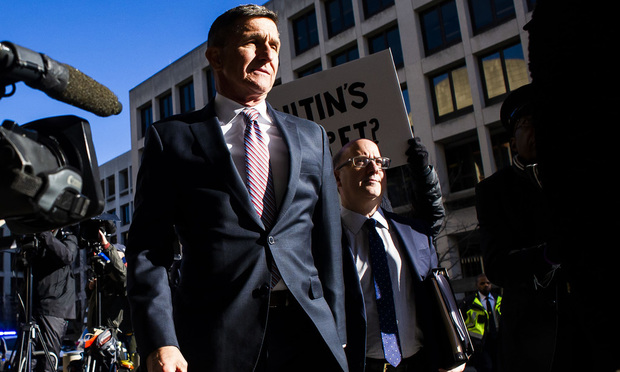Feds Seek Prison for Michael Flynn, Reversing Earlier Support for Leniency
"It is clear that the defendant has not learned his lesson," prosecutors said in the new filing Tuesday. "He has behaved as though the law does not apply to him, and as if there are no consequences for his actions."
January 07, 2020 at 12:51 PM
5 minute read
 Retired Army Lt. Gen. Michael Flynn, center, arrives at federal court in Washington, with attorney in 2018. (Photo: Diego M. Radzinschi/ALM)
Retired Army Lt. Gen. Michael Flynn, center, arrives at federal court in Washington, with attorney in 2018. (Photo: Diego M. Radzinschi/ALM)
Federal prosecutors on Tuesday recommended that Michael Flynn, the first Trump national security adviser, receive a prison sentence for lying to FBI agents in the Russia investigation, abandoning their earlier support for leniency after the retired Army lieutenant general hired new lawyers who turned from cooperating to clashing with the government.
Coming just weeks ahead of his sentencing in Washington's federal trial court, the prosecutors' reversal provided the latest indication of how Flynn's relationship with the government soured in the two years since he pleaded guilty to lying about his contacts with the Russian ambassador to the United States. The government recommended zero to six months in prison for Flynn.
"The sentence should adequately deter the defendant from violating the law, and to promote respect for the law. It is clear that the defendant has not learned his lesson," prosecutors Brandon Van Grack and Jocelyn Ballantine said in the new filing Tuesday. "He has behaved as though the law does not apply to him, and as if there are no consequences for his actions."
The government asserted that Flynn, based on recent filings from his defense lawyers, is not entitled to cooperation credit for accepting responsibility.
Flynn's sentencing is scheduled for Jan. 28 before U.S. District Judge Emmet Sullivan of the District of Columbia.
Federal judges have wide discretion in punishing defendants and are not bound by the terms of any plea deal. Any prison sentence for Flynn would likely spur speculation about a pardon from President Donald Trump, who has publicly praised his former national security adviser and wished him "good luck."
Flynn, who in 2016 led the Republican National Convention crowd in a chant of "lock her up," resigned only weeks into Trump's tenure after it was revealed he misled Vice President Mike Pence about his contacts with the Russian ambassador to the U.S. during the transition.
Flynn pleaded guilty to lying to federal investigators about those communications and agreed to cooperate with the Russia probe. In the buildup to his initial sentencing date, in December 2018, prosecutors working under Special Counsel Robert Mueller III cited the extent of his cooperating in backing Flynn's bid for a sentence without prison time.
But his sentencing was delayed after a dramatic court hearing in which Sullivan appeared to question Flynn's patriotism and signaled he was weighing the possibility of sending Flynn to prison. Rather than go forward with the sentencing, Flynn, then represented by Covington & Burling, asked to be allowed to complete his cooperation with the government.
His cooperation would instead come to a halt. In June 2019, Flynn fired his defense team at Covington and hired Sidney Powell, an outspoken critic of the Mueller investigation.
Ahead of a trial in Alexandria, Virginia, federal court, where he was expected to appear as a star witness, prosecutors said they no longer planned to call Flynn to testify against a onetime business partner charged with secretly lobbying for Turkey. In court filings, prosecutors suggested they could no longer trust that Flynn would tell the truth in testifying against the former associate, Bijan Kian, who was charged in connection with their past lobbying work for Turkey.
In their filing Tuesday, prosecutors cited Flynn's "failure to complete his cooperation in—and his affirmative efforts to undermine—the prosecution of Bijan Rafiekian" in suggesting a sentence of up to six months in prison.
With Powell at his side, Flynn mounted a months-long attack on the Justice Department, accusing prosecutors of withholding favorable evidence and FBI agents of entrapping him in a 2017 interview concerning his past communications with Sergey Kislyak, at the time Russia's top diplomat in the U.S. Sullivan last month rebuffed those claims.
 U.S. District Judge Emmet Sullivan of the District of Columbia. Photo by Diego M. Radzinschi/ALM
U.S. District Judge Emmet Sullivan of the District of Columbia. Photo by Diego M. Radzinschi/ALM"The court summarily disposes of Mr. Flynn's arguments that the FBI conducted an ambush interview for the purpose of trapping him into making false statements and that the government pressured him to enter a guilty plea," Sullivan wrote in his December ruling. "The record proves otherwise."
Prosecutors on Tuesday told Sullivan: "The defendant monetized his power and influence over our government, and lied to mask it. When the FBI and DOJ needed information that only the defendant could provide, because of that power and influence, he denied them that information."
Flynn's conduct, prosecutors asserted, "was more than just a series of lies; it was an abuse of trust."
Flynn's lawyers will get their chance later this month to tell Sullivan what they think should be an appropriate punishment.
Read more:
'The Record Proves Otherwise': Judge Knocks Down Mike Flynn's 'Ambush' Claims
'Divorced From Facts': Prosecutors Condemn Michael Flynn's 'Conspiracy Theories'
Flynn's Ex-Covington Lawyers Defend Conduct Amid Court Scrutiny
Judge Sullivan Has Read Some of Sidney Powell's Book (Or at Least the Part About Him)
Michael Flynn Hires Mueller-Critic Sidney Powell After Dumping Covington Team
This content has been archived. It is available through our partners, LexisNexis® and Bloomberg Law.
To view this content, please continue to their sites.
Not a Lexis Subscriber?
Subscribe Now
Not a Bloomberg Law Subscriber?
Subscribe Now
NOT FOR REPRINT
© 2025 ALM Global, LLC, All Rights Reserved. Request academic re-use from www.copyright.com. All other uses, submit a request to [email protected]. For more information visit Asset & Logo Licensing.
You Might Like
View All
Trump Administration Faces Legal Challenge Over EO Impacting Federal Workers
3 minute read
US Judge Cannon Blocks DOJ From Releasing Final Report in Trump Documents Probe
3 minute read
Private Equity Giant KKR Refiles SDNY Countersuit in DOJ Premerger Filing Row
3 minute readTrending Stories
- 1Who Are the Judges Assigned to Challenges to Trump’s Birthright Citizenship Order?
- 2Litigators of the Week: A Directed Verdict Win for Cisco in a West Texas Patent Case
- 3Litigator of the Week Runners-Up and Shout-Outs
- 4Womble Bond Becomes First Firm in UK to Roll Out AI Tool Firmwide
- 5Will a Market Dominated by Small- to Mid-Cap Deals Give Rise to a Dark Horse US Firm in China?
Who Got The Work
J. Brugh Lower of Gibbons has entered an appearance for industrial equipment supplier Devco Corporation in a pending trademark infringement lawsuit. The suit, accusing the defendant of selling knock-off Graco products, was filed Dec. 18 in New Jersey District Court by Rivkin Radler on behalf of Graco Inc. and Graco Minnesota. The case, assigned to U.S. District Judge Zahid N. Quraishi, is 3:24-cv-11294, Graco Inc. et al v. Devco Corporation.
Who Got The Work
Rebecca Maller-Stein and Kent A. Yalowitz of Arnold & Porter Kaye Scholer have entered their appearances for Hanaco Venture Capital and its executives, Lior Prosor and David Frankel, in a pending securities lawsuit. The action, filed on Dec. 24 in New York Southern District Court by Zell, Aron & Co. on behalf of Goldeneye Advisors, accuses the defendants of negligently and fraudulently managing the plaintiff's $1 million investment. The case, assigned to U.S. District Judge Vernon S. Broderick, is 1:24-cv-09918, Goldeneye Advisors, LLC v. Hanaco Venture Capital, Ltd. et al.
Who Got The Work
Attorneys from A&O Shearman has stepped in as defense counsel for Toronto-Dominion Bank and other defendants in a pending securities class action. The suit, filed Dec. 11 in New York Southern District Court by Bleichmar Fonti & Auld, accuses the defendants of concealing the bank's 'pervasive' deficiencies in regards to its compliance with the Bank Secrecy Act and the quality of its anti-money laundering controls. The case, assigned to U.S. District Judge Arun Subramanian, is 1:24-cv-09445, Gonzalez v. The Toronto-Dominion Bank et al.
Who Got The Work
Crown Castle International, a Pennsylvania company providing shared communications infrastructure, has turned to Luke D. Wolf of Gordon Rees Scully Mansukhani to fend off a pending breach-of-contract lawsuit. The court action, filed Nov. 25 in Michigan Eastern District Court by Hooper Hathaway PC on behalf of The Town Residences LLC, accuses Crown Castle of failing to transfer approximately $30,000 in utility payments from T-Mobile in breach of a roof-top lease and assignment agreement. The case, assigned to U.S. District Judge Susan K. Declercq, is 2:24-cv-13131, The Town Residences LLC v. T-Mobile US, Inc. et al.
Who Got The Work
Wilfred P. Coronato and Daniel M. Schwartz of McCarter & English have stepped in as defense counsel to Electrolux Home Products Inc. in a pending product liability lawsuit. The court action, filed Nov. 26 in New York Eastern District Court by Poulos Lopiccolo PC and Nagel Rice LLP on behalf of David Stern, alleges that the defendant's refrigerators’ drawers and shelving repeatedly break and fall apart within months after purchase. The case, assigned to U.S. District Judge Joan M. Azrack, is 2:24-cv-08204, Stern v. Electrolux Home Products, Inc.
Featured Firms
Law Offices of Gary Martin Hays & Associates, P.C.
(470) 294-1674
Law Offices of Mark E. Salomone
(857) 444-6468
Smith & Hassler
(713) 739-1250











